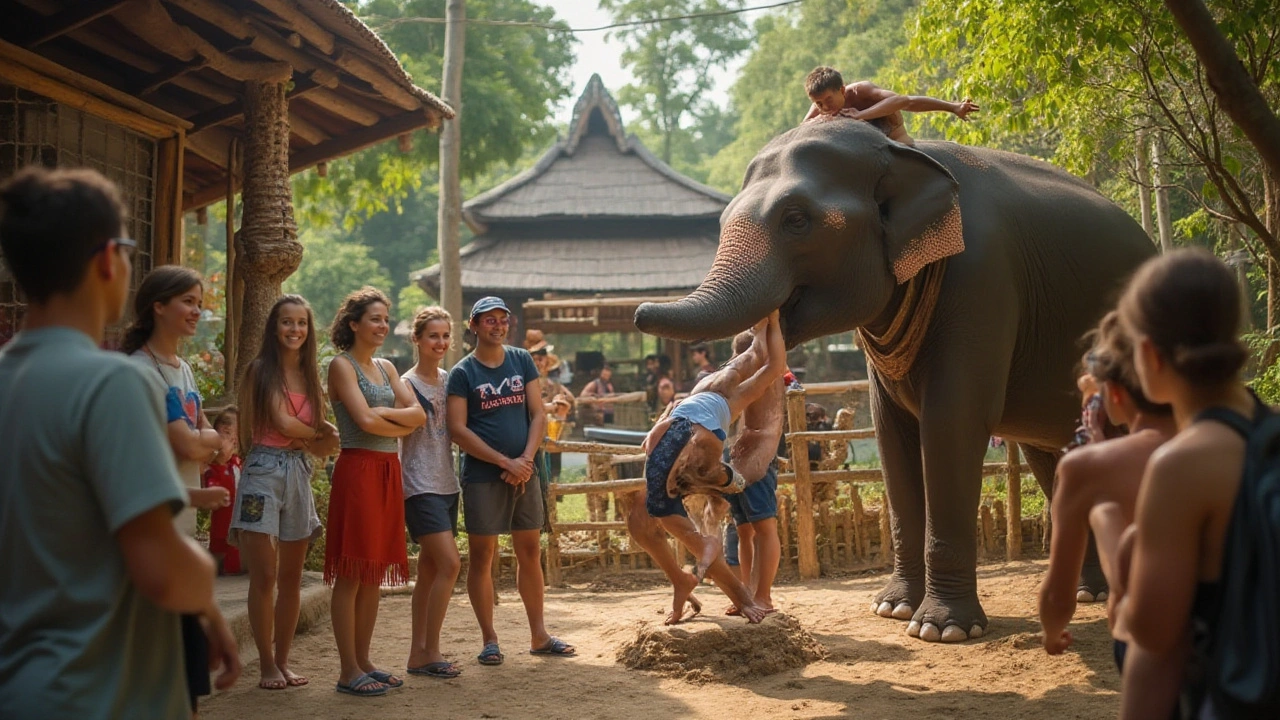Imagine lying down on a serene beach in Thailand, feeling the soft breeze and hearing the gentle crashing of waves. Suddenly, you experience the press of a large yet gentle foot on your back, providing an unexpected but pleasant pressure. This is the magic of elephant massage, an age-old practice where elephants use their trunks and feet to deliver a unique form of therapy.
This practice combines traditional Thai massage techniques with the natural instincts of elephants, resulting in a mesmerizing form of therapy that is both soothing and awe-inspiring. But how did this extraordinary practice begin? And what makes elephants so skilled in providing this kind of massage? In this article, we’ll explore the fascinating history behind this practice, the surprising benefits it offers, and the ethical considerations involved in enjoying this remarkable experience.
- History and Origins of Elephant Massage
- The Skillset of Elephants
- Health Benefits of Elephant Massage
- A Typical Elephant Massage Session
- Ethical Considerations and Tourism
History and Origins of Elephant Massage
Elephant massage is an ancient practice that can be traced back to the heart of Southeast Asia, particularly Thailand, where the bond between humans and elephants has always been strong. Elephants have held a revered place in Thai culture for centuries, not only as majestic beasts of burden but also as symbols of royal power and spiritual significance. It is within this cultural framework that the unique practice of elephant massage emerged.
Initially, elephants in Thailand were used predominantly for logging and ceremonial purposes. Their impressive strength and docile nature made them indispensable in navigating the dense forests and mountainous terrains of the region. As these tasks involved strenuous labor, mahouts—elephant trainers and caretakers—noticed that elephants would often use their trunks to massage each other and themselves as a form of relaxation and relief from muscle tension. This observation marked the first step towards the development of what is now known as elephant massage.
The connection between elephant massage and traditional Thai massage lies in the shared emphasis on pressure points and gentle stretching. Thai massage itself has ancient roots, influenced by Indian Ayurvedic practices and Buddhist traditions. Through centuries of close association with elephants, mahouts began to adapt these massage techniques to harness the natural abilities of elephants, teaching them to replicate specific movements to provide therapeutic relief to humans.
Interestingly, not all elephants have the aptitude for massage. It requires a special bond of trust between the elephant and its trainer, alongside rigorous training. Mahouts often start training their elephants from a very young age, employing positive reinforcement techniques to ensure that the animals are comfortable and willing participants in the massage process. This gentle approach ensures the well-being of the elephants while allowing their unique therapeutic potential to shine.
"The first time I witnessed an elephant massage, I was astounded by the gentle precision with which the elephant touched its human subject. It was a testament to the deep bond and mutual understanding shared between the mahout and elephant," notes Dr. Surin Chanprasert, a respected expert in Thai traditional medicine.
The popularity of elephant massage began to grow as word spread about its incredible benefits. Today, it is not only a sought-after wellness experience but also a part of eco-tourism initiatives aimed at conserving these intelligent creatures. Resorts and wellness centers offering elephant massage often emphasize ethical treatment and the preservation of elephant habitats, ensuring that visitors can enjoy this extraordinary practice while contributing to the well-being of the animals.
Therefore, elephant massage is more than just a novel spa experience; it is a practice deeply rooted in Thai culture and history. It serves as a beautiful example of how humans and animals can work together to enrich each other's lives. The journey from its humble beginnings to its modern-day prominence as a tourist attraction reflects the enduring bond between humans and one of nature's most magnificent creatures.
The Skillset of Elephants
Elephants are renowned for their intelligence and dexterity, making them surprisingly adept at massage therapy. One might wonder how these majestic creatures, known primarily for their size and strength, can perform such delicate tasks. The answer lies in the intricate design of their bodies, particularly their trunks. An elephant's trunk is composed of over 40,000 muscles, and they use it with remarkable precision. This allows them to perform tasks as delicate as picking a single blade of grass or as powerful as uprooting a tree.
Their ability to gauge pressure precisely makes them exceptional at *elephant massage*. They can intuitively sense how much weight to place and where, providing therapeutic pressure without causing harm. According to a study published in the journal Applied Animal Behaviour Science, elephants possess a high degree of social intelligence, often displaying empathy and understanding, which enhances their ability to engage in therapeutic interactions with humans.
“Elephants are extraordinary in their capacity for empathy and sensitivity. These qualities make them uniquely suited for roles that require a gentle touch and an understanding of human emotions,” says Dr. Lucy King, a renowned elephant behaviorist.
Interestingly, many of these elephants are trained through positive reinforcement, a method that encourages the natural behaviors of the animal. Trainers reward them with treats and praise for performing the correct actions. This has led to the preservation of humane training methods that ensure the well-being of the elephants while enabling them to perform their skills with enthusiasm and care.
Beyond their physical abilities, elephants have a deep-rooted cultural significance in regions like Thailand. They have been part of traditional healing practices for centuries, often integrated into the culture’s wellness rituals. This historical context adds an additional layer of authenticity and reverence to the *elephant massage* experience. Elephants, with their unique skill set, have captured the imagination and hearts of those seeking a blend of nature, tradition, and healing.

Health Benefits of Elephant Massage
Surprisingly, elephant massage offers numerous health benefits, merging the best of traditional Thai massage techniques with the intuitive touch of these gentle giants. One of the main advantages is stress relief. The rhythmic and gentle pressure applied by elephants can significantly reduce stress levels and promote relaxation. This is much like human massages where the release of endorphins leads to a better mood.
Another remarkable benefit is pain relief. For individuals suffering from chronic pain or muscle tension, the firm yet delicate pressure exerted by an elephant’s trunk and feet can alleviate discomfort. Many people who experience this rare practice report a substantial reduction in muscle stiffness and soreness.
Improved blood circulation is another key benefit. The massage movements stimulate blood flow, which enhances oxygen and nutrient delivery to body tissues. This improved circulation helps in detoxifying the body, expediting muscle recovery, and promoting overall health.
“Experiencing an elephant massage was transformative. The pressures were perfectly intuitive, and my body felt rejuvenated,” shared Maria Thompson, a wellness tourist who experienced this therapy in Thailand.Beyond physical advantages, there are mental health benefits. The unique interaction with elephants fosters a sense of connection with nature, which is profoundly calming and fulfilling. For many, this bond offers emotional healing, reducing symptoms of anxiety and depression.
An underrated yet significant benefit is the enhancement of mindfulness. During an elephant massage, individuals are often more present, focused on the here and now. This heightened sense of mindfulness can contribute to long-term mental well-being and stress management.
Additionally, this type of massage can improve sleep patterns. The deep relaxation achieved can help those with insomnia or irregular sleep schedules find more restful sleep. Being close to nature, amidst the soothing sights and sounds of the environment, enhances this benefit.
Researchers have shown that physical touch can have a profound effect on human health. In the case of elephant massage, this is amplified by the affectionate and calming presence of elephants. It's a testament to the multi-faceted benefits of such a distinctive form of animal therapy.
A Typical Elephant Massage Session
Envision walking into a tranquil sanctuary surrounded by lush greenery and the melodious chirping of birds. You're greeted by a friendly guide who introduces you to the magnificent elephant that will be your masseuse for the session. The handlers, known as mahouts, have a deep bond with their elephants, ensuring a safe and harmonious environment for both the animals and the guests. They lead you to a cushioned mat laid out on the ground, where you'll lie down to start the session.
The elephant waits patiently as you settle in, using its trunk to explore and understand your body. This initial touch is not just to make you comfortable but also allows the elephant to gauge the amount of pressure needed. Then, with careful precision, the elephant places its padded foot on your back. The pressure is firm but controlled, offering a deep tissue massage that targets stress points effectively. The sensation is unique, blending the gentle yet strong touch of the elephant with the natural landscape surrounding you.
During the session, the elephant alternates between using its trunk and feet, mimicking traditional Thai massage techniques. The trunk, flexible and strong, moves in rhythmic motions, kneading muscles and easing tension. The mahouts often guide the elephant through these movements, whispering commands and offering gentle nudges, ensuring that both you and the elephant are synchronized. The combination of human direction and the elephant's instinct creates a seamless experience that is both relaxing and invigorating.
Some sessions may include additional elements like aromatherapy, with essential oils to enhance relaxation. Spectators often find themselves mesmerized by the sheer gentleness and expertise of the elephant. Children and adults alike are encouraged to participate, under the careful watch of the mahouts, making it a family-friendly activity. As you feel the day's stresses melt away, it’s not uncommon to hear calming sounds of traditional Thai music playing softly in the background.
The session usually lasts around 30 minutes to an hour, depending on your preference and comfort level. Once it’s over, the elephant often gives a playful trumpet, as if to signal the end of the massage. You’ll likely find yourself feeling deeply relaxed and surprisingly rejuvenated. Many describe the experience as a profound connection with nature, like tapping into an ancient, gentle energy that lingers long after the session ends.
Elephant massage therapy is not just about relaxation; it's an immersive experience into the lives of these magnificent animals. The sessions serve as a reminder of the harmony that can exist between humans and animals. It's an opportunity to learn from them, to understand their emotions and responses, creating a bond that goes beyond a typical therapeutic session. You'll come away with not only a relaxed body but a new perspective on the intelligence and gentleness of elephants.
"An elephant's touch is both powerful and tender at the same time. It’s an experience that connects you to the very soul of these majestic beings." – Dr. Jane Goodall
Whether you're a wellness enthusiast or an animal lover, an elephant massage offers an unforgettable experience that combines deep relaxation with an extraordinary bond with nature. It's a journey into the ancient practices of Thai massage, enhanced by the gentle giants that have captivated human hearts for generations.

Ethical Considerations and Tourism
The practice of elephant massage undoubtedly offers a unique experience, but it also raises significant ethical questions. One primary concern is the well-being of the elephants involved in these activities. To ensure that the animals are not exploited, it is crucial to understand how tourism impacts them and what steps are taken to maintain their health and happiness.
In many parts of Southeast Asia, including Thailand, elephants are considered national treasures. They are often safeguarded by laws and regulations aimed at ensuring their welfare. However, there are still instances where unethical practices occur, largely driven by the demand from tourists. Activities such as elephant rides and shows might compromise the well-being of these gentle giants. Ethical tours aim to avoid such practices by focusing on animal-friendly methods.
Organizations like the Save Elephant Foundation advocate for responsible tourism. They promote sanctuaries that allow elephants to live in a natural and caring environment, where they are not forced to perform unnatural behaviors. According to a representative from the foundation, "Ensuring the welfare of elephants means providing them with an environment where they can express their natural behaviors without suffering from overwork or abuse." This approach not only benefits the elephants but also offers tourists a more genuine and educational experience.
When it comes to choosing an elephant massage experience, it's imperative to select establishments with a proven track record of ethical treatment. Many ethical sanctuaries conduct regular health checks and follow strict guidelines for the handling and training of elephants. This way, the animals can engage in therapeutic practices without experiencing stress or harm. Supporting these establishments helps promote a standard where the well-being of the elephants is prioritized.
Another essential aspect to consider is the role of local communities. Ethical tourism should empower local populations by providing fair wages and supporting community initiatives. This can be observed in certain regions where communities run and manage elephant sanctuaries. These community-led initiatives ensure that economic benefits are repatriated locally while maintaining high standards of animal care.
Lastly, it’s important for tourists to be well-informed and responsible. Before participating in any animal therapy activities, one should research and verify the ethics of the establishments involved. Tourists should look for certifications from reputable animal welfare organizations and read reviews from previous visitors. By making informed choices, tourists play a crucial role in promoting humane and sustainable tourism practices.
| Aspect | Consideration |
|---|---|
| Animal Welfare | Ensuring elephants are not overworked or abused |
| Community Impact | Empowering local communities through fair wages and initiatives |
| Tourist Responsibility | Researching and choosing ethical establishments |
